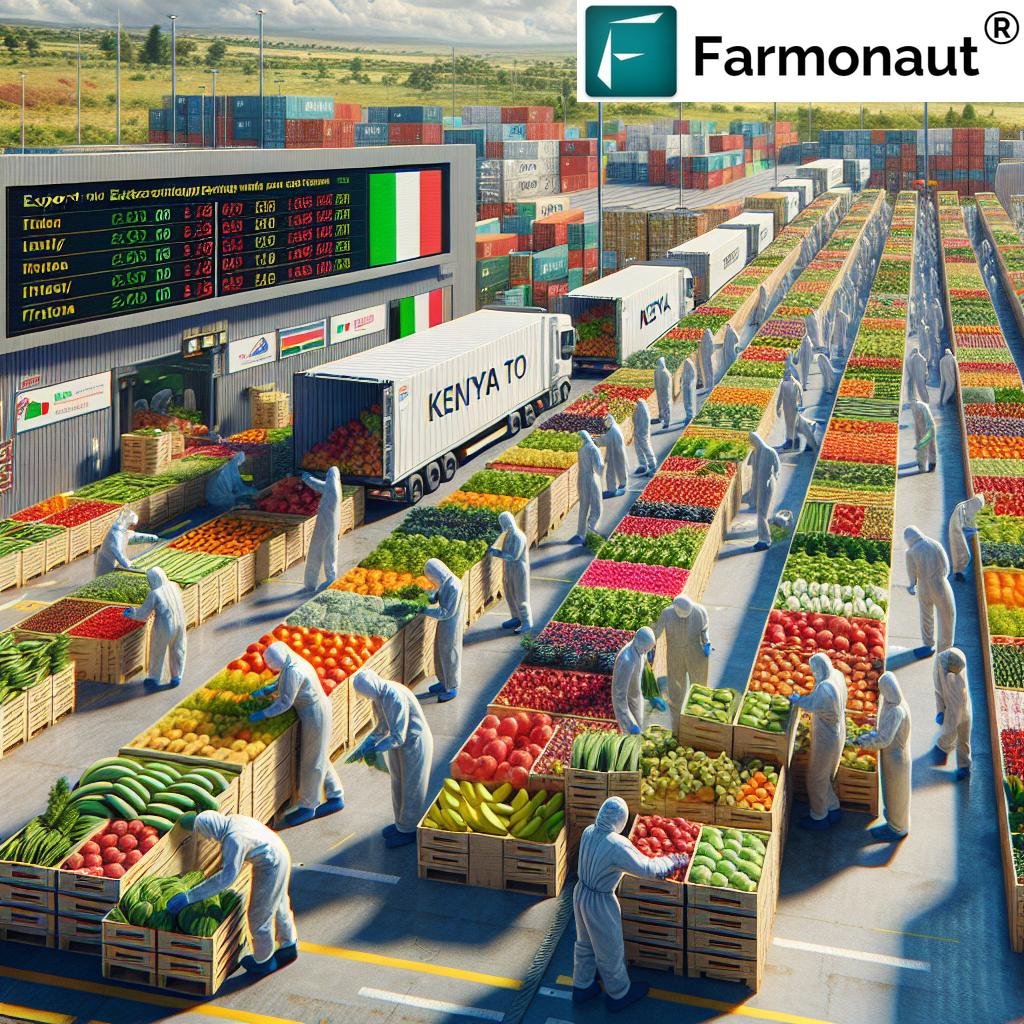Kenya’s Horticultural Exports: Expanding EU Market Share and Italian Trade Opportunities
“Kenya aims to increase its Italian market share by 2% and targets Sh3.6 billion in exports over 5 years.”
In the ever-evolving landscape of global agriculture, Kenya stands as a beacon of horticultural excellence, particularly in its trade relations with the European Union (EU). As we delve into the intricate world of Kenya’s horticultural exports, we uncover a story of ambition, strategy, and growth that promises to reshape the country’s position in the competitive EU market.
Kenya’s horticulture exports to the European Union are set for a significant boost as the nation embarks on a strategic journey to increase its market share, with a particular focus on Italy and other key EU nations. This blog post explores Kenya’s concerted efforts to strengthen horticultural trade partnerships and expand its footprint in crucial export markets.
Kenya’s Horticultural Export Landscape
Kenya has long been recognized as a leader in horticultural exports, renowned for its high-quality produce that graces European markets. The country’s diverse range of exports includes vibrant flowers, succulent fruits, aromatic herbs, and crisp vegetables. However, recent data from the Agriculture and Food Authority (AFA) reveals a slight decline in export volumes to the EU, dropping from 213,180 metric tonnes valued at Sh80.3 billion in 2023 to 188,956 metric tonnes worth Sh71.8 billion in 2024.
Despite this temporary setback, Kenya’s resolve to strengthen its position in the EU market remains unwavering. The country is now setting its sights on expanding its market share, with a particular emphasis on the Italian market.

Targeting Italian Market Growth
The Agriculture Food Authority (AFA) has confirmed that Kenya is intensifying its efforts to increase its horticulture export market share to Italy by an ambitious 2 percent. This strategic move is part of a broader initiative to enhance Kenya’s presence in the European Union market.
Dr. Bruno Linyiru, the Director General of AFA, emphasizes that Kenya already controls a substantial market share in the EU due to its reputation for producing high-quality horticultural products. The country is now seeking partnerships with key global marketing and trade agencies to promote the export of local produce, aiming to tap into unexploited markets and drive export growth.
Kenya’s ambition is clear: to reach approximately Sh3.6 billion in exports to Italy over the next five years. This target underscores the country’s commitment to not only maintain but significantly expand its horticultural trade with Italy, which currently ranks as the 11th largest global trading partner for Kenyan horticultural products.
Current Export Dynamics
To understand the scale of Kenya’s horticultural trade with Italy, let’s look at the numbers. Over the past five years, Kenya’s horticulture export volumes to Italy totaled 23,217 tonnes, valued at Sh10.4 billion. This represents 3 percent of Kenya’s total EU export value, which stands at an impressive Sh375 billion.
The composition of Kenya’s horticultural exports to the EU is diverse:
- Fruits lead the pack at 55 percent
- Flowers follow at 36 percent
- Herbs and spices contribute 18 percent
- Vegetables account for 1 percent
This diverse portfolio showcases Kenya’s ability to cater to various segments of the European market, from the ornamental flower industry to the fresh produce sector.
Strategies for Market Expansion
Kenya’s approach to expanding its EU market share, particularly in Italy, is multifaceted:
- Maintaining High Standards: The country is committed to upholding rigorous quality standards through the Horticultural Code of Practice, ensuring that all exports meet EU requirements.
- Implementing Traceability Systems: Kenya has put in place comprehensive traceability systems to track products from farm to final destination, enhancing quality control and building trust with European consumers.
- Exploring Unexploited Market Segments: While Kenya is already a leader in the EU market, efforts are underway to identify and penetrate new market segments that offer growth potential.
- Addressing Phytosanitary Challenges: Kenyan authorities are working diligently to mitigate risks associated with pests like the false codling moth (FCM), which has previously hindered exports.
- Partnerships and Trade Fairs: Collaborations with entities like MACFRUIT, a prominent Italian trade fair, are opening new avenues for Kenyan exporters to showcase their products and forge business connections.
“Kenya is a leading EU supplier of fruits, flowers, herbs, and vegetables, focusing on expanding unexploited market segments.”
The Role of Technology in Horticultural Exports
In today’s digital age, technology plays a crucial role in enhancing agricultural productivity and ensuring the quality of exports. Innovative solutions like those offered by Farmonaut are revolutionizing the way farmers and exporters manage their crops and ensure compliance with international standards.
Farmonaut’s satellite-based farm management solutions provide valuable tools for Kenyan farmers and exporters:
- Real-time crop health monitoring
- AI-based advisory systems
- Blockchain-based traceability
- Resource management tools
These technologies can help Kenyan farmers optimize their production, ensure quality control, and provide the traceability that EU markets demand. By leveraging such advanced tools, Kenya can strengthen its position as a reliable and high-quality supplier of horticultural products to the EU.
Overcoming Challenges in EU Exports
While Kenya’s horticultural sector shows immense promise, it’s not without its challenges. One of the primary hurdles has been compliance with the EU’s stringent agricultural regulations. The Horticultural Crops Directorate (HCD) reports that over 70 percent of Kenyan farmers are already on track to comply with new EU regulations, particularly those related to pest control and product safety.
The false codling moth (FCM) has been a significant concern, but efforts are underway to implement effective pest management strategies. By addressing these challenges head-on, Kenya is not only protecting its current market share but also positioning itself for future growth.

The Italian Connection: MACFRUIT and Beyond
The recent signing of a Memorandum of Understanding (MOU) between the Italy-based trade fair MACFRUIT and AFA marks a significant milestone in Kenya’s efforts to expand its presence in the Italian market. This partnership aims to expose Kenyan farmers and exporters to the vast potential of the Italian market, with the goal of increasing horticulture exports by more than five percent by 2030.
Renzo Piraccini, the president of MACFRUIT, highlighted Kenya’s potential not just in avocados but across various horticultural sectors. The upcoming MACFRUIT exhibition in Italy this May is poised to create valuable business opportunities and provide Kenyan exporters with crucial market insights.
Kenya’s Competitive Edge in the EU Market
Kenya’s success in the EU horticultural market can be attributed to several factors:
- Quality Produce: Kenyan fruits, flowers, and vegetables are renowned for their high quality and freshness.
- Diverse Product Range: From roses to avocados, Kenya offers a wide variety of horticultural products that cater to different market segments.
- Strategic Location: Kenya’s geographical position allows for efficient air freight to European markets, ensuring product freshness.
- Established Trade Relations: Years of trade have built strong partnerships between Kenyan exporters and EU importers.
- Commitment to Standards: Kenya’s adherence to international quality and safety standards enhances its reputation in the EU market.
The Role of Technology in Enhancing Exports
As Kenya aims to increase its market share and export value, technology plays a pivotal role in achieving these goals. Advanced agricultural technologies can help Kenyan farmers and exporters in several ways:
- Precision Farming: Tools like Farmonaut’s satellite-based crop monitoring can help farmers optimize their production, leading to higher yields and better quality produce.
- Traceability: Blockchain-based solutions ensure that every step of the supply chain is recorded, meeting EU requirements for product traceability.
- Quality Control: AI-powered systems can help detect and address issues in crop health, ensuring that only the best produce reaches European markets.
- Resource Management: Advanced tools for managing water, fertilizers, and other resources can lead to more sustainable and efficient farming practices.
By leveraging these technologies, Kenyan farmers and exporters can enhance their competitiveness in the EU market, meet stringent quality standards, and increase their export volumes.
Explore Farmonaut’s API for advanced agricultural insights
Future Prospects and Growth Potential
The future of Kenya’s horticultural exports to the EU, particularly to Italy, looks promising. With a targeted approach to market expansion, continued focus on quality, and the adoption of innovative technologies, Kenya is well-positioned to achieve its goal of increasing its Italian market share by 2% and reaching Sh3.6 billion in exports over the next five years.
Key areas of focus for future growth include:
- Expanding into new product categories
- Enhancing value-added processing capabilities
- Strengthening logistics and cold chain infrastructure
- Developing niche markets for specialty products
- Increasing organic and sustainable farming practices
By focusing on these areas, Kenya can not only meet its export targets but also establish itself as a leader in sustainable and high-quality horticultural exports to the EU.
Kenya’s Horticultural Exports to EU Markets
| EU Country | Current Market Share (%) | Target Market Share (%) | Main Export Products | Export Volume (metric tons) | Export Value (Sh billion) | Growth Potential |
|---|---|---|---|---|---|---|
| Italy | 3% | 5% | Fruits, Flowers, Herbs | 23,217 | 10.4 | High |
| Netherlands | 35% | 37% | Flowers, Vegetables | 66,134 | 25.1 | Medium |
| Germany | 15% | 17% | Fruits, Vegetables | 28,343 | 10.8 | Medium |
| UK | 20% | 22% | Flowers, Fruits | 37,791 | 14.4 | High |
The Role of Farmonaut in Supporting Kenya’s Horticultural Exports
As Kenya strives to expand its horticultural exports to the EU, particularly to Italy, advanced agricultural technologies play a crucial role. Farmonaut, a leading provider of satellite-based farm management solutions, offers tools that can significantly benefit Kenyan farmers and exporters in their quest for growth and quality improvement.
Farmonaut’s platform provides several key features that align with Kenya’s export goals:
- Satellite-Based Crop Health Monitoring: This technology allows farmers to monitor their crops’ health in real-time, ensuring that only the highest quality produce is exported to EU markets.
- AI Advisory System: Farmonaut’s Jeevn AI provides personalized farm advice, helping Kenyan farmers optimize their crop management and meet EU standards.
- Blockchain-Based Traceability: This feature ensures transparency in the supply chain, a critical factor for EU importers and consumers.
- Resource Management Tools: These help farmers optimize their use of water, fertilizers, and other inputs, leading to more sustainable and efficient farming practices.
By leveraging these technologies, Kenyan farmers can enhance their productivity, ensure consistent quality, and maintain the traceability required by EU regulations. This, in turn, can help Kenya achieve its ambitious export targets and strengthen its position in the competitive EU horticultural market.
Access Farmonaut’s API Developer Docs for integration guides
Sustainable Practices and EU Market Access
The European Union places a strong emphasis on sustainable agricultural practices. As Kenya aims to increase its market share, adopting and showcasing sustainable farming methods becomes increasingly important. Farmonaut’s carbon footprinting feature can help Kenyan agribusinesses monitor and reduce their environmental impact, aligning with EU sustainability requirements and consumer preferences.
By demonstrating a commitment to sustainable practices, Kenyan exporters can not only meet EU regulations but also appeal to the growing segment of environmentally conscious European consumers. This can open up new market opportunities and help differentiate Kenyan produce in the competitive EU market.
Empowering Smallholder Farmers
A significant portion of Kenya’s horticultural production comes from smallholder farmers. Empowering these farmers with access to advanced agricultural technologies is crucial for achieving the country’s export goals. Farmonaut’s affordable and accessible solutions can play a vital role in this regard, helping smallholder farmers improve their productivity and meet international quality standards.
By democratizing access to precision agriculture tools, Farmonaut can help level the playing field, allowing smaller Kenyan farms to compete effectively in the global market. This inclusivity is essential for sustainable growth in Kenya’s horticultural export sector.
Conclusion: A Bright Future for Kenya’s Horticultural Exports
As we’ve explored throughout this blog post, Kenya’s horticultural export sector is poised for significant growth, particularly in the Italian and broader EU markets. With a strategic focus on increasing market share, maintaining high-quality standards, and leveraging advanced technologies, Kenya is well-positioned to achieve its ambitious export targets.
The combination of Kenya’s natural advantages – its climate, soil, and strategic location – with innovative agricultural technologies and a commitment to sustainability creates a powerful formula for success in the competitive EU market. As the country continues to invest in its horticultural sector and adopt cutting-edge solutions like those offered by Farmonaut, we can expect to see Kenya’s presence in European supermarkets and flower shops grow even stronger in the coming years.
The journey ahead is filled with opportunities, and with the right strategies and tools, Kenya’s horticultural exports are set to flourish, bringing economic benefits to farmers, exporters, and the nation as a whole.
FAQ Section
Q: What are Kenya’s main horticultural exports to the EU?
A: Kenya’s main horticultural exports to the EU include fruits (55%), flowers (36%), herbs and spices (18%), and vegetables (1%).
Q: What is Kenya’s target for increasing its market share in Italy?
A: Kenya aims to increase its horticulture export market share to Italy by 2% over the next few years.
Q: How much does Kenya aim to export to Italy in the next five years?
A: Kenya is targeting to reach approximately Sh3.6 billion in exports to Italy over the next five years.
Q: What challenges does Kenya face in exporting to the EU?
A: Key challenges include compliance with EU agricultural regulations, pest management (particularly the false codling moth), and maintaining consistent quality standards.
Q: How is technology helping Kenya’s horticultural export sector?
A: Technologies like satellite-based crop monitoring, AI advisory systems, and blockchain-based traceability are helping Kenyan farmers improve productivity, ensure quality, and meet EU standards.
Earn With Farmonaut: Affiliate Program
Earn 20% recurring commission with Farmonaut’s affiliate program by sharing your promo code and helping farmers save 10%. Onboard 10 Elite farmers monthly to earn a minimum of $148,000 annually—start now and grow your income!














